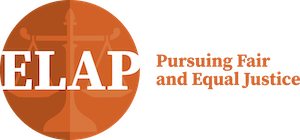In October, ELAP launched a new program to expand access to civil legal aid for people in King County. Thanks to grant funding from the CARES Act, ELAP was able to match local attorneys with people in need of legal advice or resources. Attorneys in the program charge a low hourly fee, which was covered by the grant, and the service is free for people seeking help. This program served 61 people in just two months. We asked Elena Yager and Jessica Lewis about their experience working in this program for ELAP:
Why did you decide to work with ELAP as a low-bono attorney?
First, we are passionate about providing quality affordable legal services. We run a nonprofit that works with low- to moderate-income folks, so when the opportunity arose to expand our reach and help more people, we jumped at it. Second, we love ELAP. When we were freshly out of law school, we both had the good fortune of being selected as fellows for ELAP’s yearlong family law fellowship, so this is an organization that is very near and dear to our hearts. All to say: increasing access to justice in partnership with our buds was a no brainer.
What types of cases did you help clients with through this program?
We have been able to help clients with a pretty wide variety of legal issues, including petitioning for domestic violence protection orders, helping survivors defending against abusive protection orders, addressing violations of DVPOs by abusers (whether that be by informal discussions, or going to court), assisting folks in filing their cases and even attempting to have a (fraudulently requested) default judgment vacated. If not for this ELAP program, many of these folks would have struggled greatly to navigate the court system, enforce their court orders or find safety.
How has this pandemic changed your work? Can you highlight a few challenges and opportunities you’ve experienced?
COVID has created a whole host of new challenges in working with survivors, and it’s also presented some unique opportunities. On the client-facing side of things, we have seen challenges with how and when we communicate. Prior to COVID, survivors who were planning to leave the family home, but who were still living with their abuser while they arranged to depart, could often find time to speak or email with us while they or their abuser were away from the home (often at work). However, with COVID came wide-spread instances of folks working from home. In turn, we saw survivors with increasingly limited windows of opportunity to speak with us. This is something that we have had to be very aware of—to have carefully scheduled calls and communications during times that the client feels is safe or when they are less likely to be overheard by their abuser.
Relatedly, in light of COVID, we no longer meet with clients in-person at all. This has presented its own challenges as we work to establish and maintain trust and confidence with clients who have never actually met us. We are very aware that for the survivor, discussing domestic violence with a stranger over the phone or a video call can feel especially difficult and intrusive. We try our best to ameliorate this by approaching the conversations with survivors in an exceptionally caring and non-judgmental way. On the court-facing side of things, processes are ever-changing, so the way we do something Monday may be totally different by Tuesday. This is tricky even for seasoned attorneys—it’s downright impossible for unrepresented parties who are experiencing trauma.
One happy consequence of COVID is that hearings are taking place over the phone, so survivors are not forced to be in a room with their abuser. The survivor no longer runs the risk of bumping into their abuser in the parking lot or elevator on the way to their hearing. The survivor is now able to relay their experiences and fears to the commissioner or judge without their abuser standing mere feet away from them. Our clients have all been incredibly grateful for this.
Elena Yager and Jessica Lewis are attorneys and co-executive directors at Northwest Advocacy Foundation.



